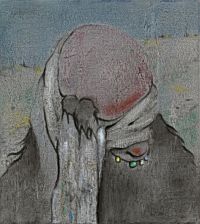|
Some Blogs

Beyond Time
New & Selected Work
1977 - 2007
Robert Gibbons
|

The Evening Visitor
Jean Paul Lemieux
(1956 )
_______________________
Is "Against Theory" a Pragmatism?
Paul Grimstad
The Minnesota Review
Pragmatism's injunction to abandon metaphysics might then be thought of as setting the stage for the radically different idioms of Heidegger's ontology and Carnap's logicism, or what is sometimes called the Continental/analytic divide (see Follesdal and Friedman).
We should see "Against Theory" as a literary-critical avatar of this agon of intellectual temperament, but one in which the different sides of the divide are conflated through a complex (and in some ways unconscious) inheriting of pragmatism's role in setting twentieth-century philosophy down these peculiarly incompatible paths. If the "theory" they attack is the offspring of a certain strain of French Heideggerianism—a Derridean inheritance, referenced in "Against Theory" in an Americanized, New Critically-inflected Paul de Man—then the language they adopt to attack it might be traced back to the analytic philosophy exemplified in Carnap (or perhaps the early Wittgenstein). Considering this set of inheritances, the essay's target should not be seen as the tendency in literary criticism toward theoretic generalization, for as we have already pointed out the very premise of "Against Theory" is itself a colossal generalization about the identity of meaning and intention. Rather, the essay should be read as a (complexly equivocal) attack on a whole ideology of theory as "non-sense," in which the bitingly direct sentence is designed to replace Continental wooliness....(more)
_______________________
The International Literary Quarterly: Issue 5
Four Poems from Edward Hopper
Ernest Farrés
Translated from the Catalan by Lawrence Venuti
Planetary American Literature: Jonathan Franzen and Dave Eggers
Paul Giles
.....................................................
Imagining Posterity, then and now
Gillian Beer
Will posterity be very different from us? Even if we continue to look alike we may not be alike. In ‘Heredity’ Thomas Hardy gives a voice to the family face:
I am the family face;
Flesh perishes, I live on,
Projecting trait and trace
Through time to times anon,
And leaping from place to place
Over oblivion.
But that face gives no assurance of recognition. The conditions of life change life, yes. So people’s judgments and the forms of their desires are likely to change. But the passions of the infant surviving in each of us are recalcitrant to change. Those infantile passions may be our one kinship and continuity with posterity.
Posterity is a secular concept. It involves no transcendence, though it frequently includes the hope of improvement. In eschatological systems such as Marxism its role is to provide hope, as if wisdom may be further accrued after revolution. In evolutionary theory the power of the individual to produce progeny, with their promise of further diversification through generations, signals at once the continuance and change of particular species. Evolutionary theory does not allow us to look far into the future. The processes of change within a long environment – itself composed of so many competing needs and desires – are so multifactorial that there is no telling what the outcomes may be. There is no long plan, no arc of teleology. Looking back, indeed, as Darwin insists, what we see is the vanishing of species, the collapse of history. The opposite of posterity is extinction. And extinction is ordinary, as Darwin everywhere recognises:
of the species now living very few will transmit progeny of any kind to a far distant futurity; for the manner in which all organic beings are grouped, shows that the greater number of species of each genus, and all the species of many genera, have left no descendants, but have become utterly extinct.
– though in the final paragraph of the Origin, on the next page, he insists on the capaciousness of survival and suggests a hierarchical activity for extinction: Natural Selection[entails] ‘Divergence of Character and the Extinction of less-improved forms.’ In his late Autobiography Darwin faced the extreme future, when the earth will grow too cold for life. He mourned the passing of what he hoped would by then be much improved forms of life, but he accepted its inevitability. Even posterity is a time-bound concept.
In the current nightmares of the future, posterity is called in evidence against us. We have defiled, defaced, distorted, the resources current in the world. Posterity will hold us to account and condemn us – if posterity survives to do so. Posterity may do so. But posterity probably won’t think about us very much. It will be preoccupied with its own concerns, and will take for granted the conditions in which it finds itself. It will, after all, be the present. So I disagree with the frequently expressed view, that without hope for posterity life becomes bleak and society self-destructs.
We may feel concern for posterity, but we can scarcely love it. It is the present we inhabit where love is felt. Literature and other arts can make portable that present, taking what was past into the future, realising it in the shifting now. I don’t deny that we may be squandering the future in our present behaviour. But those future generations will live out their time in an environment more probably changed than obliterated, and one that we cannot foresee. We may do our best, but we shouldn’t imagine that we can control what is to come, or that we shall be much remembered for good or ill in those changed times....(more)
thanks to Andrew Seal at Blographia Literaria
_______________________
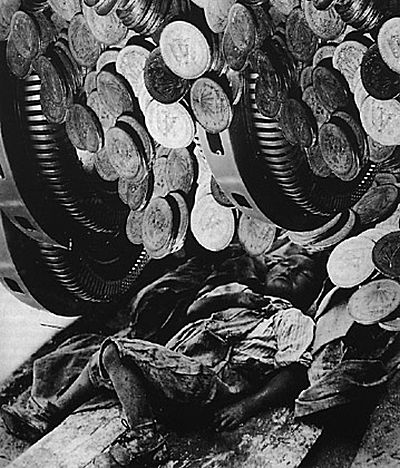
El sueño de los pobres
[The Dream of the Poor]
1935
Lola Alvarez Bravo
1907-1993
wife of Manuel Alvarez Bravo
Lola Alvarez Bravo ... in the light of the reflectors _______________________
The G-20 Washout
Mike Whitney
The financial crisis is being used by Wall Street big-wigs to restructure the economy and create a permanent class of working poor.
The world doesn't need a new Breton Woods or a new world order; it needs a competing vision of global finance. One that will put an end to dollar tyranny, superpower politics and "beggar thy neighbor" economic policies. A system that strengthens national sovereignty, cooperation, and international law. That's what the G 20 should have been talking about, instead of wasting their time trying to prop up a system that's rotten to the core. ...(more)
_______________________
The Great Depression of the 21st Century: Collapse of the Real Economy
Michel Chossudovsky
The upper spheres of Wall Street overshadow the real economy. The accumulation of large amounts of money wealth by a handful of Wall Street conglomerates and their associated hedge funds is reinvested in the acquisition of real assets.
Paper wealth is transformed into the ownership and control of real productive assets, including industry, services, natural resources, infrastructure, etc. (....)
Paper wealth accumulated through insider trading and stock market manipulation is used to acquire control over real economic assets, displacing the preexisting ownership structures.
What we are dealing with is an unsavory relationship between the real economy and the financial sector. The financial conglomerates do not produce commodities. They essentially make money through the conduct of financial transactions. They use the proceeds of these transactions to take over bona fide real economy corporations which produce goods and services for household consumption.
In a bitter twist, the new owners of industry are the institutional speculators and financial manipulators. They are becoming the new captains of industry, displacing not only the preexisting structures of ownership but also instating their cronies in the seats of corporate management....(more)
_______________________
US's Road to Recovery Runs Through Beijing
Francesco Sisci and David P Goldman
For the past decade, poor people in the developing world have financed the consumption of rich people in America. America has borrowed nearly $1 trillion a year, mostly from the developing world, and used these funds to import consumer goods and buy homes at low interest rates. The result is a solvency crisis of the American household, which shows up as a solvency crisis for financial institutions. _______________________
Naomi Klein on the Bailout Profiteers and the Multi-Trillion-Dollar Crime Scene
_______________________
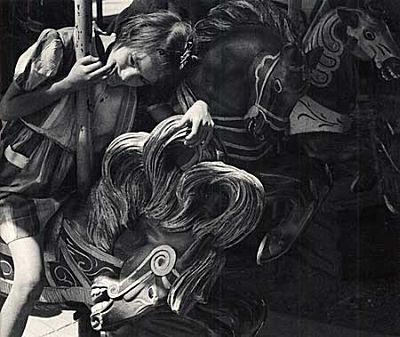
El Rapto
(Abduction)
Lola Alvarez Bravo
ca. 1940s
1 2
_______________________
Poems by Tsvetanka Elenkova
Translated by Jonathan Dunne
The International Literary Quarterly
Colours Are Laid In The Dark
At the beginning of every film, as at the end, there are several black frames where it is joined to the cartridge and to the spool of the camera so that it can rewind, so that it isn’t exposed. While in the cartridge, the whole film is black. If it has advanced and you open it in the light, it also turns black. So sensitive on the road to Damascus or some other city. Colours are laid in the dark only with measured light. As much as filters through a straw hat or a pair of sunglasses. A flash. And when it’s processed we look at the pictures.
...(more)
_______________________
Michel Foucault, Philosopher? A Note on Genealogy and Archaeology [PDF]
Rudi Visker
parrhesia: a journal of critical philosophy
issue five
via infinite thØught
_______________________
The Moose Stops Here
Frank Rich
Election junkies in acute withdrawal need suffer no longer. Though the exciting Obama-McCain race is over, the cockfight among the losers has only just begun. The conservative crackup may be ugly, but as entertainment, it’s two thumbs up!(....)
The G.O.P. ran out of steam and ideas well before George W. Bush took office and Tom DeLay ran amok, and it is now more representative of 20th-century South Africa during apartheid than 21st-century America. The proof is in the vanilla pudding. When David Letterman said that the 10 G.O.P. presidential candidates at an early debate looked like “guys waiting to tee off at a restricted country club,” he was the first to correctly call the election.(....)
The Republicans did this to themselves, yet a convenient amnesia can be found in conservatives’ post-Election Day soul searching. There’s endless hand-wringing about Bush and McCain blunders and Abramoff-Stevens corruption, but there’s barely any mention of the nasty cultural brawls that defined the G.O.P. campaign narrative this year as the party clung bitterly once more to its 40-year-old “Southern strategy.”...(more)
_______________________
The Center-Right Nation Exits Stage Left
Tod Lindberg
_______________________
No More Mangers:
Talibangelicals Celebrate Torture Death of Christ By Selling Christmas-Spirit-y Electric Burning Crosses
No Blood for Hubris
_______________________

Red Scene
1933-6
Percy Wyndham Lewis
November 18, 1882 - March 7, 1957
_______________________
America’s Wars of Self-Destruction
Chris Hedges
War is a poison. It is a poison that nations and groups must at times ingest to ensure their survival. But, like any poison, it can kill you just as surely as the disease it is meant to eradicate.(....)
if Barack Obama drinks, as it appears he will, the dark elixir of war and imperial power offered to him by the national security state, he will accelerate the downward spiral of the American empire.
_______________________
Georgia and Russia: the aftermath
Donald Rayfield
Why Did the West Ignore the Truth About the War in Georgia?
The US and UK left the impression that Russia was the guilty party
Mary Dejevsky
How US claims about Syria became media facts
Unwary journalists who repeat US army claims about Syria and Iraq become tools in a propaganda war
Sharif Nashashibi
_______________________

Skeleton Cave (1954)
Cora Cheney
I well remember bringing this home from
John McCrae Public School in Riverside (Windsor) - mw
Nostalgia for the Scholastic Book Club, circa '60's & '70's
via Levi Asher
Literary Kicks
_______________________
From Wildwood
a novel-in-progress by Tanyo Ravicz
The International Literary Quarterly
I have come to recover the lost survey lines on a parcel of state land which I intend to make my own. Northwest gales confined me to Kodiak town for three days before a Super Cub on floats was able to set me down in this bight on the north shore of the island. The pilot saw treacherous-looking rocks looming under the water, and not wanting to put a hole in his floats he actually landed me two miles east of my goal in country he’s more familiar with. Now that he’s gone, I’m filled with cautious excitement, hoisting my pack and stepping across the beach. The air is quiet and all the proportions of life seem altered. Up on the cliffs there’s the skeleton of a cabin, and the beach is strewn with the relics of a boat wreck. Something I have noticed before in Alaska: what the human element loses in eminence, it gains in tragic grandeur. Here is the rusty, barnacled box of a diesel engine stamped Detroit, and here’s a broken foredeck pierced with hand-forged nails....(more)
_______________________
Louis Zukofsky: New Author Page
PennSound

Toshio Shibata Tepper Takayama Fine Arts
Photography
1 2 3
_______________________
no man’s land #3 – Winter 2008/2009 Online Now
German literature in translation
promenade toward fungi, eumenides discussion & canalisation
Bert Papenfuss
translated by Rosmarie Waldrop
cows, cows, cows; cow flops & coltsfoot I suppose
& black berries, the gate of fame sank in the brambles
brollacham & buhmann snuggeled in the basalt column quarry
right of the rhine and cisalpine wishsausaging wallowed
reticence & unprofessionality hours on tabula
drugs that mugged, love to the death your threat
but I won’t suffer it, rather die myself
tracked by a squadron of mediawise con men
snapped the schnapsnosed mammal thrice for air
his hellhound round the bend strolled on stormwatch
& we skulked bed-& bulletward into an inn
each thinking he gave more, than he took
& this loss is the so-called evil in the world
that never errs, we concurred; nonesoever twosoever
none, nothing, hardly even naught: go rest among the alders
via Dwayne D. HayesAbsinthe Minded
_______________________

A Boat-Builder's Yard
Francis Danby
b. Nov. 16, 1793
_______________________
For the answer to the question, ‘Why do American liberals carry on about racism and sexism when they should be carrying on about capitalism?’, is pretty obvious: they carry on about racism and sexism in order to avoid doing so about capitalism. Either because they genuinely do think that inequality is fine as long as it is not a function of discrimination (in which case, they are neoliberals of the right). Or because they think that fighting against racial and sexual inequality is at least a step in the direction of real equality (in which case, they are neoliberals of the left). Given these options, perhaps the neoliberals of the right are in a stronger position—the economic history of the last thirty years suggests that diversified elites do even better than undiversified ones. But of course, these are not the only possible choices.
- Walter Benn Michaels, Against Diversity
_______________________
Operation Enduring Disaster
Breaking with Afghan Policy
Tariq Ali
Obama would be foolish to imagine that Petraeus can work a miracle cure in Afghanistan. The cancer has spread too far and is affecting U.S. troops as well. If the American media chose to interview active-duty soldiers in Afghanistan (on promise of anonymity), they might get a more accurate picture of what is happening inside the U.S. Army there.
I learned a great deal from Jules, a 20-year old American soldier I met recently in Canada. He became so disenchanted with the war that he decided to go AWOL, proving -- at least to himself -- that the Afghan situation was not an inescapable predicament. Many of his fellow soldiers, he claims, felt similarly, hating a war that dehumanized both them and the Afghans. "We just couldn't bring ourselves to accept that bombing Afghans was no different from bombing the landscape" was the way he summed up the situation. (....)
Domestic pressure in the U.S. to pull out of Afghanistan remains weak, but could grow rapidly as the extent of the debacle becomes clearer and NATO allies refuse to supply the shock-troops for the future surge.
In the meantime, they're predicting a famine in Afghanistan this winter. ...(more)
.....................................................
No End to the Savagery in Afghanistan
Robert Fisk
Back in Afghanistan, the mind turns to the small matter of savagery. Not the routine cruelty of war, but the deliberate inhumanity with which we behave. The torture and killing of prisoners in this pitiful place—the American variety in Bagram and the Taliban variety in Helmand—is a kind of routine of history. Even execution has to be made more painful. A knife is more terrible than a bullet. The cult of the suicide bomber in the Middle East began its life in Lebanon, moved to “Palestine”, arrived in Iraq, leached over the border here to Afghanistan and passed effortlessly through the Khyber Pass into Pakistan. And New York. And Washington. And London ...(....)
Such cruelty is abetted with a bodyguard of clichés—“police operations”, “clean up”, “mop up”, “surgical strikes”—where you can kill by remote control, “especially when the media are not present to show the realities of a conflict”. This is most certainly the case today, for what journalist will now dare to wander the village streets of Helmand or the city of Baquba in Iraq or, for that matter, the border towns of Pakistan? War has never, it seems, been so underreported. And both the good guys and the bad guys like it that way; they prefer to indulge in savagery unseen....(more)
_______________________

Weir Dam
Sullivan County, TN
Toshio Shibata
_______________________
from Archicembalo
G.C. Waldrep
conjunctions
What Is The Real Answer
There is this high keening I can do nothing about. It is the source of many things. The breaking of bread, for instance. A concealed (refr)action. There are small armies among us, and they seek out the most moist places.
Every sound is tropical, every sound is perishable. My aunt sends one wrapped in butcher paper & string. I refuse to open it and so it remains on a shelf next to Blackwell's Curious Herbal and a bag of homemade noodles, quivering.
In the eighteenth century it was not uncommon for large landowners to conclude that nursemaids were spies. Dear outrageous cataleptic inhibitor, their letters would begin, Dear Anglophone gasconade. Heft of a pomegranate. I add cider vinegar, I add extra oil. Knead until the muscles of each palm register their pulsed exequies. The honey, the redress. The observer and the observed. With maturity becomes the desire to be asked, no longer to play the supplicant. When my Lord asks a question winter answers for me. Why I prefer doors to windows, bridges to saints. Why insist on scumble.
(Do we choose the means of our drowning? Or do others choose for us?)
At night in my room I practice each dance step, slowly, carefully. After the manner of an exile.
In this dream I wash locks, tubs of Yales, until my fingers begin to bleed. I splash sudsy water on the cold flagstones. No one else is around. Every now and then I think I hear a sound from the next room, but I am mistaken. ...(more)
_______________________

Hinohara Village, Tokyo
Toshio Shibata
_______________________
If the most secular of Western countries, France, became victim of the "Americanization", i.e. of "religization" of political discourse, then modern secularism is dead.
On Intelligent Design and the Left
Cats, Dogs and Creationism
Jean Bricmont
...there are two routes open to the believer. There is that of Sarah Palin, clinging literally to the belief system, in spite of all evidence to the contrary. That school of Christians enter into direct conflict with science. Or one can choose the metaphorical route, which most liberal and European Christians (including even the Pope, at times) follow -- declare that, whenever the Scriptures conflict with science, they have to be "interpreted" in a non-literal way. That leads to total defeat for religious belief, because, if the parts of the Scriptures that can be checked with the facts are not to be taken seriously, why pay any attention to the parts that cannot be checked (notably concerning Heaven and Hell or God himself )? The whole of liberal Christianity is the result of a double standard: follow the Scriptures whenever they are "metaphysical" or ethical and cannot be checked independently, and discard them when they can. Since God is not good enough to tell us what he really meant in his "revelations", and which parts have to be taken seriously and which parts not, we are left with total arbitrariness.
People who call themselves agnostics are often confused about these two notions of God. What they claim to be agnostic about is the philosopher’s god not, say, the Gods of Homer. With respect to the latter, they are atheist, just as all religious people are atheist with respect to all gods except their own.(....)
The problem for the American left is that, if nobody ever does anything to combat religious ideas, then, a century from now, any conceivable left will still be stuck with tens of millions of "fundamentalist" Christians who will vote "with their faith" against any rational or progressive policy and even against their own economic interests. It is true that it is an unpopular struggle -- but so was it in France in the 18th century. It is also true that the effects will only be felt in the long run -- but if nobody ever starts doing anything, nothing will ever change. The catastrophic impact of the Christian fundamentalists (without them, the world would probably not have had to suffer Reagan or Bush) is largely the result of the past indifference of the American progressives towards religion.
The deep reason why progressives should oppose religion is that it is irrational and arbitrary. A better world is necessarily a more rational world, a world where people search for solutions to human problems based on the facts of the world and with the help of reason. The Critique of Intelligent Design gives us an enjoyable and enlightening introduction to the philosophical underpinnings of such an attitude....(more)
_______________________
All the Languages in the World
Zbigniew Mentzel
Translated from the Polish by Antonia Lloyd-Jones
words without borders
Awakening
It was a terrible dream.
At first I couldn't find my bearings in it - I didn't know what I was actually dreaming about, what I felt afraid of, or what those big chunks of raw meat were supposed to be; despite being beaten to a bloody pulp, they were still showing signs of life.
Only a while later, when an image loomed out of the confusion, moved towards me and came into sharp focus did I catch sight of an infinite multitude of human tongues, torn from the living or the dead, tongues that somebody's invisible hands were using to erect a huge pyramid-shaped building, or else a sky-high sacrificial pyre.
I watched in horror as more and more tongues kept appearing: brown, livid blue, or almost black, and it looked to me as if thousands, millions of mouths still had power over them, for even as they joined up, lumped together and turned into the shapeless mass that was serving as a building material, never for a moment did they come to a standstill--they just kept on moving in feverish convulsions, as if the whole of mankind, cruelly mutilated, as if the whole world - our world - were . . . crying for help? Asking a question? Cursing? Praying? Begging for mercy?...(more)
_______________________
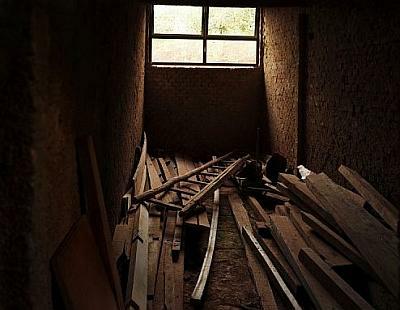
Asilo
Greg Miller
via Shane Lavalette
_______________________
Radical Psychology
A Journal of Psychology, Politics, and Radicalism
Volume Seven
via Philosophy's Other
The Psychotic Element in Everyday Group Thinking:
Reflections on the Salem Witch Trials
Diana Semmelhack and Larry Ende
Post Vietnam Syndrome:
National Identity, War, and the Politics of Humiliation
Myra Mendible .....................................................
“ ‘Are You Sure, Sweetheart, That You Want to Be Well?’ ”:
An Exploration Of The Neurodiversity Movement
Kathyrn Boundy
During a discussion of the embodiment of cultural knowledge and the ways in which (forced) assimilation can be experienced as a violation enacted in the deepest level of self, Jacqui Alexander quotes the opening scene of Toni Cade Bambara’s The Salt Eaters, in which one character asks another, ‘Are you sure, sweetheart, that you want to be well?’. This question gets at the heart of many of the issues with which the Neurodiversity movement and the people who identify themselves as part of the communities from which this movement stems are concerned. What does it mean to be ‘well’? Who is it that gets to decide if one is well or not? By what criterion is this decision made? Is it the subjective experience of the patient which determines wellness? The opinion of the medical community? The extent to which a person is able to blend effectively into the social and economic world, regardless of the possible cost to the person doing the blending? In a world in which emotional, perceptual, intellectual and interpersonal experience can come in many forms and configurations, who is it that must accommodate whom and to what extent? To what extent do the so-called ‘neurotypical’ have the right to enforce their social and behavioral rules and expectations on those whose ways of experiencing themselves and the world differs from the accepted norm?...(more)
_______________________

Imabari City
Ehime Prefecture
Toshio Shibata
_______________________
from
Draft 59: Flash Back
Rachel Blau DuPlessis
conjunctions
4.
Exam:
Why use the alphabet to organize,
or why not? Discuss.
Suggest another mechanism of order.
One form and then another.
Something that sort of ends, but sort of not.
The alphabet is existentially funny.
Lettristic vaudeville can be adequate.
I mean there's satisfaction arriving at
(English) "zed," and (American) "zee"
but no insistence that anything particular be.
Other end points where "arrival" is dissolved?
Maybe a grid with limits.
Maybe lengths of ribbon simply
cut to tie these presents.
Maybe qwerty or another
job-lot keyboard.
Pessoa's was azerty.
But this is controversy
without particular point. One form or then another--
it means something, but in itself leads nowhere.
A Form itself, abstract, is not
self-evident in meaning.
It's not one anything.
"Form" is its particular use
its histories and extensions, its situated outreach,
its power and prods.
Who has designs on us? and Why?
What is the force of our conviction?
Something had gotten away from us
urgency for justice, intensities of ire,
all of this.
Where is it?
What are the real goals of this desire?
...more
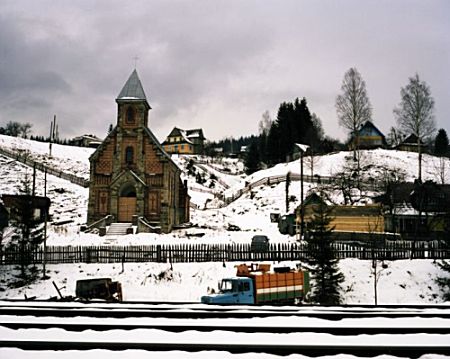
along some roads
Andres Gonzales
via Heading East
_______________________
Places don’t always travel with people
but the place that held my attention
for half my life still aggravates a flow
of associations. And when I write out
the points of entry into that discursive
instability, I remember those places as
the sites of danger. I think of the duplicity
of landscape images and text, those
photos of old men fishing, the paintings
and clever songs about place and
what is described in the follows—
the becoming, and then the disappearing,
the whirlpool in the center of the story of
the construction of locally produced landscape.
I put a river on a map. I can talk with conviction
About the Upper Nass. My home in Prince George
isn’t large or secluded. I live among the poor.
In my early days on the Nass, I spent much
of my time looking for food until I escaped.
Lan(d)guage
a sequence of poetics
Ken Belford
In Ken Belford's fifth book of poetry he takes us on a journey through Canada's roadless north where he has discovered a third world gaze, looking out at industrialism and its impact on a region abundant in resources and natural beauty. Lan(d)guage is an unsentimental and non-reactionary perspective, a deep investigation of the psychology of both the electronic revolution and postmodernism. It is also a collective conversation having to do with the mobile geographies of inequality. The poems are a study in the social cost of privilege and what it means to have access to power, surveillance and identity.
Ken Belford’s lan(d)guage
rob mclennan
_______________________
Homo horribilis
Ken Belford
I was sacrificed in politics on a sloping floor. If I could
close my eyes to the gap between ourselves and livestock
and the billions of animals in factory farms could stand
their bloody ground; and the bloodlines of the animals
who are not useful to men meant more than mere lives
that may be killed, and if all life was evident – if
the trade in heads was no longer kept alive, hooks
would straighten out and we would not just protect
and give prizes to the safe but make flourish poets
of resistance once again. The power to allow life would
extend to all living beings, but in the narrative,
the means are justified and called necessary suffering.
Ken Belford poems [PDF] Treeline 3
Orbits
Ken Belford
In theory, words crowd together
in traffic jams. Words enter and
exit the poem. Ellipses close in
on themselves. In the university,
the innermost poets whirl around
the center. Gravity is not an external
force but a product of the universities
and their orbit poets. There are two locations -
one inside the circle and one outside.
In between the two is the coronation circle.
When a poet enters the university,
banks lock them in. Interstellar poets
frequently collide and convert
their energy into shock waves.
The unstable poets move in lockstep
while the faster ones slow down
and the slower speed up. This is how
they bring themselves into synch.
The slower get hit by waves from behind.
Self reinforcing and amplified
by a variation in rates and proximity,
the barred poets follow the orbits.
It’s called a conference when
their poets randomly pass close
to each other. But they soon separate
again, not unlike cars on the highway.
Books occur when they rotate at the same rate.
_______________________
Viewed from the Mountains: A Conversation with Ken Belford [PDF]
The Ken Belford Issue
It's still winter:
a web journal of contemporary poetry and poetics
Vol. 7.1
_______________________
How Characters Became the Masters and the Author Their Apprentice
José Saramago
Nobel Lecture, December 7, 1998
Translated from the Portuguese: Tim Crosfield and Fernando Rodrigues
When painting my parents and grandparents with the paints of literature, transforming them from common people of flesh and blood into characters, newly and in different ways builders of my life, I was, without noticing, tracing the path by which the characters I would invent later on, the others, truly literary, would construct and bring to me the materials and the tools which, at last, for better or for worse, in the sufficient and in the insufficient, in profit and loss, in all that is scarce but also in what is too much, would make of me the person whom I nowadays recognise as myself: the creator of those characters but at the same time their own creation. In one sense it could even be said that, letter-by-letter, word-by-word, page-by-page, book after book, I have been successively implanting in the man I was the characters I created. I believe that without them I wouldn't be the person I am today; without them maybe my life wouldn't have succeeded in becoming more than an inexact sketch, a promise that like so many others remained only a promise, the existence of someone who maybe might have been but in the end could not manage to be....(more)
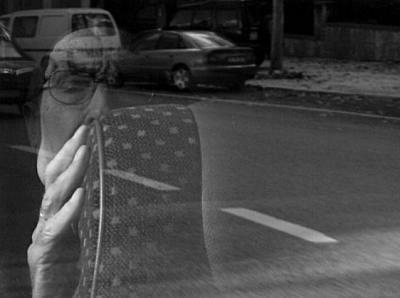
José Saramago
b. Nov. 16, 1922 O Caderno de Saramago
Jose Saramago' blog, started this fall in his 85th year.
in Portuguese
The Unexpected Fantasist
Fernanda Eberstadt
Religion feeds on death
Translation of La religión se alimenta de la muerte, an interview by Miguel Mora with José Saramago published in El País on 12-Nov-2005.
Zenit Translations
_______________________
In Favor of Sarcasm
Stan Apps
elective annoyance
The writer is free to create the fiction that human beings really care, that there is this intense and humane universal sense of care, and that that is the rectitude that underlines our self-righteousness. But the writer who creates that fiction is being a scoundrel, since she or he is actually collaborating with the conservatives to create a complaisant fiction. In fact, the inequity is right out on the table surrounded by genuine attitudes of indifference and annoyance at the ugliness of it all. Structural inequity is structural contempt, and contempt, not compassion, is the emotion that we cannot avoid since it is inscribed in the most basic levels of our social contract. Sarcasm is a net of whirling blades made out of ambient contempt. There are few legitimate responses to a world in which idealistic narratives are repeatedly used to devastate communities, where devastation is routinely applauded as long as it is for the sake of ideals. With ideals like these we don’t need enemies. The matter-of-fact and the sarcastic are tools for the combat against false ideals. And if the world is an onion with layer after layer of hypocrites, weeping as they’re pulled away? I think I would encourage individuals to avoid being hypocrites, to the extent that that is possible for them or anyone....(more)via Nick Piombino
_______________________
The Wild Wordsmith of Wasilla
Dick Cavett
What will ambitious politicos learn from this? That frayed syntax, bungled grammar and run-on sentences that ramble on long after thought has given out completely are a candidate’s valuable traits?
And how much more of all that lies in our future if God points her to those open-a-crack doors she refers to? The ones she resolves to splinter and bulldoze her way through upon glimpsing the opportunities, revealed from on high. via Joseph Duemer
_______________________
Sarah Palin: Gay Icon
Rohin Guha
...let's take this moment to remember her not only as a hateful loon who accidentally found herself lost in the American mainland, but also as a tailor-made gay icon -- the type of collectible Caribou Barbie doll whose accessories include a few pairs of shoes, baby Trig, and the obligatory hunting rifle.
_______________________
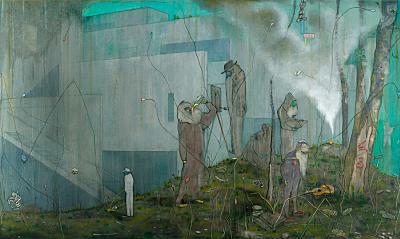
New Accursed Art Club
Nigel Cooke
1 2 3 4
_______________________
Good Times: Convergence, Conflict, & Chaos
Richard J. Cox
comments presented at the plenary session at the Association of Moving Image Archivists in Savannah, Georgia on November 13th.
Reading Archives
One of the primary issues archivists need to deal with in the Digital era is the notion that everything can be saved. The belief in this is pervasive, from individuals developing software, such as MyLifeBits, to record everything, to leaders (and many followers) in the library, information, and computer sciences fields who regularly state such a belief. The idea that everything can be saved may be the mantra of the digital true believer. Not only does this idea and its supporters ignore the other technical issues of retrieval, the ability to retrieve and retain important contextual meaning, and the costs of maintenance, the reason for or logic behind saving everything is usually avoided. It is interesting that many information professionals who have embraced the notion of adding value to the sources they administer are also so quick to embrace such utopian notions as utilizing the technology to save everything....(more)
_______________________

Paolo Pellegrin
Double Blind - War in Lebanon
Paolo Pellegrin
_______________________
Wear Good Shoes: Advice to young photographers
Alec Soth assembles 35 responses
magnum blog
Paolo Pellegrin
...every time you compose and release the shutter you give voice to your thoughts and opinions of the world around you. So other than the obvious patience (photography is a complex medium, a voice which requires time to develop) and perseverance and the necessary humility when dealing with others, I would recommend working to become a more developed and informed individual, a more knowledgeable and engaged citizen. This will translate into a deeper more complex understanding of the world around you, and ultimately into a richer and more meaningful photography.
...(more)
|
